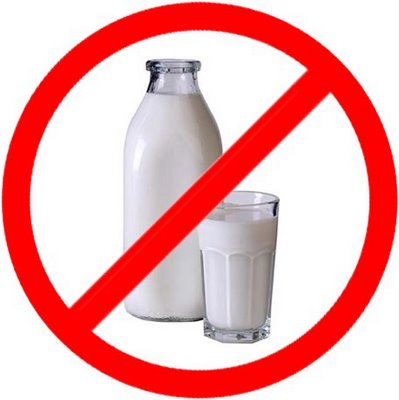I think we should start with defining some things first.
Lactose is a type if sugar found in dairy products. Lactose intolerance
is a word that is often misapplied to a wide variety of conditions from
dairy allergies, milk fat intolerance and the actual intolerance of the
lactose sugar. Commonly people will apply the term lactose intolerance
to anyone who has difficulty with milk products. All of these
conditions have varied intensity depending on the body.
Does dairy cause lactose intolerance?
No. Dairy does not cause lactose intolerence. Any of the above definitions of lactose intolerence have a biological and often genetic deficiency in the body that interacts with the presence of milk. The condition itself is not caused by milk.
What is lactose intolerance?
Someone who has lactose intolerance either doesn't produce enough lactase or produces no lactase at all. Lactase is an enzyme that breaks down lactose. Someone who doesn't produce enough may just feel a little nausea when dairy is consumed. Someone who produces no lactase may have severe symptoms such as vomiting, fever and diarrhea. Several over-the-counter medications exist to help individuals consume dairy without issues.
What is an intolerance to milk fat?
There isn't much research on milk fat intolerance but the research available suggests that approximately 5-9% of those who believe they have lactose intolerance may have both lactose and milk fat intolerance or just a milk fat intolerance. Since research is very limited it is hard to say much more about this condition.
What is milk allergy?
An allergy means your immune system has labeled an otherwise harmless substance as something that is dangerous to the body. In the case of dairy allergies it is usually one of the proteins that trigger the allergy. When a non - allergic person consumes dairy the body simply digests it. When an allergic person eats dairy they digest it but one or more compounds in the dairy triggers an immune response. This immune response can be mild, sometimes termed milk or dairy sensitivity. In some the immune response can be so intense that it can cause severe illness or even death.
Milk allergies are also most common in children. Most often
the milk allergy develops before one year of age and most children grow
out of the allergy by 4 or 5. Findings have shown that some infants
produce large quantities of antibodies that are related to one or more
types of milk...cow and breast milk allergies are the most common.
Sometimes the allergy persists into adulthood and allergy
tests are required to determine which components of the dairy (sugars,
proteins or fats) are causing the reactions do that diet can be more
appropriately managed.
Common allergic symptoms include swelling of the lips,
tongue or face or rashes, hives or skin irritation when one comes in
contact with the allergen. In some cases anaphylaxis occurs or other
life threatening symptoms such as airway constriction from the swelling.
Casein reactions and intolerance.
Casein is a large group of phospoprotein found in all mammalian milk. These proteins make up about 80% of cows milk and 45% of breast milk. Casein is present in many foods including dairy, breads, pancakes, margarine, non - dairy creamers and many other foods. Casein is present in higher quantities in dairy which means there will be a greater reaction to dairy products. This can often lead individuals to believe they have lactose intolerance. Casein allergy and intolerance is very uncommon some studies suggest 1% or less of the individuals who have reactions to dairy are reacting to casein.
Casein is a large group of phospoprotein found in all mammalian milk. These proteins make up about 80% of cows milk and 45% of breast milk. Casein is present in many foods including dairy, breads, pancakes, margarine, non - dairy creamers and many other foods. Casein is present in higher quantities in dairy which means there will be a greater reaction to dairy products. This can often lead individuals to believe they have lactose intolerance. Casein allergy and intolerance is very uncommon some studies suggest 1% or less of the individuals who have reactions to dairy are reacting to casein.
Milk and other conditions
As a sugar lactose can interact with diseases where sugar is concerned such as diabetes. Other conditions such as Cerebral Folate Deficiency which interacts with the antibodies present in various types of milk, including breast milk. In addition some medication interact with or are less effective when taken with milk or with milk in the stomach. If you are ever concerned about any of these interactions you should be sure to talk to your doctor and pharmacist.
More information:
